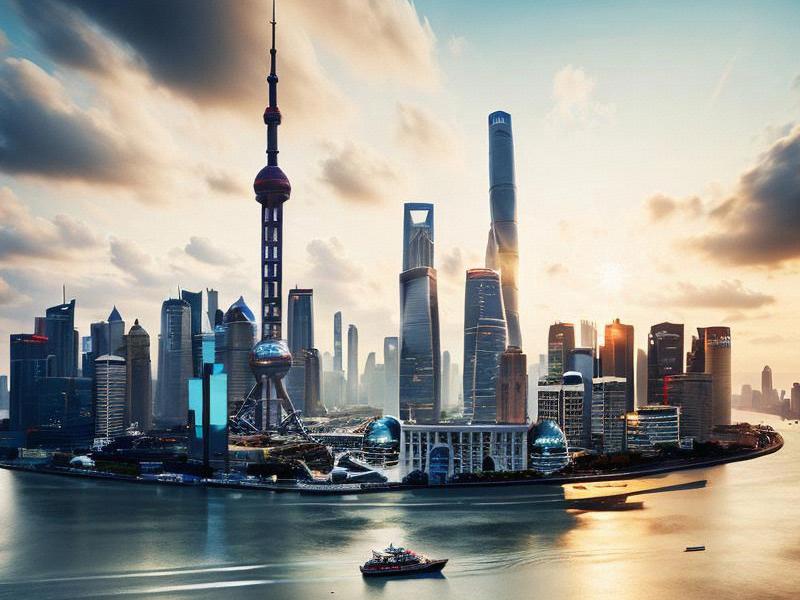
In the 21st century, Shanghai has emerged as a beacon of progress and innovation in China and around the world. Once a modest fishing village, the city has undergone a breathtaking metamorphosis, evolving into a sprawling metropolis that is a testament to human ingenuity and determination. Today, Shanghai stands as a symbol of China's rapid economic rise and its commitment to sustainable urban development.
The city's transformation is evident in its skyline, which is now dominated by some of the tallest buildings in the world. The iconic Oriental Pearl Tower, the Jin Mao Tower, and the Shanghai Tower are not just architectural marvels but also symbols of the city's ambition and drive. These structures have become synonymous with Shanghai's status as a global financial and commercial center.
However, Shanghai's story is not just about skyscrapers and economic growth. It is also a tale of resilience and sustainability. As the city grapples with the challenges of urbanization, such as traffic congestion, pollution, and housing shortages, it has taken bold steps to ensure that its growth is inclusive and environmentally responsible.
One of the key strategies that Shanghai has adopted is the promotion of green technology and sustainable practices. The city has invested heavily in renewable energy sources, such as solar and wind power, and has set ambitious targets for reducing carbon emissions. For instance, Shanghai aims to achieve carbon neutrality by 2050, a goal that requires significant changes in energy consumption patterns and industrial processes.
In addition to environmental initiatives, Shanghai has also focused on improving the quality of life for its residents. The city has invested in public transportation infrastructure, including the expansion of its metro network and the development of bike-sharing programs. These measures have helped to reduce traffic congestion and improve air quality, making the city more livable for its inhabitants.
爱上海419论坛 Moreover, Shanghai has embraced innovation as a driving force for its development. The city has established several high-tech zones and innovation hubs, such as the Zhangjiang Hi-Tech Park and the Shanghai漕河泾新兴技术开发区 (Xu Jia Hui Emerging Technology Development Zone). These areas have attracted numerous startups and multinational corporations, fostering a vibrant ecosystem of innovation and entrepreneurship.
The success of these initiatives is reflected in Shanghai's economic performance. The city has consistently ranked among the top global financial centers, with its stock exchange being one of the largest in the world. Shanghai's port is also the busiest container port globally, handling millions of containers annually and serving as a vital link in international trade.
However, the rapid pace of development has not been without challenges. One of the most pressing issues is housing affordability. As the demand for housing in Shanghai continues to rise, many residents struggle to afford homes in the city. To address this issue, the government has implemented various measures, such as increasing the supply of affordable housing and regulating the real estate market.
Another challenge is traffic congestion. With a population of over 24 million, Shanghai faces significant pressure on its transportation infrastructure. The city has responded by investing in public transportation and promoting carpooling and other sustainable modes of travel. Additionally, the government has introduced policies to encourage the use of electric vehicles, which are more environmentally friendly than traditional gasoline-powered cars.
上海龙凤419会所 Despite these challenges, Shanghai remains committed to its vision of becoming a global leader in innovation and sustainability. The city has set ambitious goals for the future, including the development of smart cities and the promotion of digital transformation. By leveraging advanced technologies such as artificial intelligence, big data, and the Internet of Things, Shanghai aims to enhance the efficiency and livability of its urban environment.
One of the key projects in this regard is the construction of the Shanghai Smart City. This initiative involves the integration of digital technologies into various aspects of urban life, such as transportation, healthcare, and education. For example, the city has implemented intelligent traffic management systems that use real-time data to optimize traffic flow and reduce congestion. In healthcare, Shanghai has developed telemedicine platforms that enable patients to consult with doctors remotely, improving access to medical services.
In education, Shanghai has embraced digital learning tools and platforms that enhance the quality of teaching and learning. The city has also established innovation labs and maker spaces where students can experiment with new ideas and technologies, fostering a culture of creativity and innovation.
Shanghai's commitment to sustainability is also evident in its efforts to protect its natural environment. The city has developed green spaces and urban forests, such as the Century Park and the Shanghai Botanical Garden, which provide residents with opportunities to connect with nature. Additionally, Shanghai has implemented strict regulations on industrial emissions and waste management, ensuring that economic growth does not come at the expense of environmental quality.
上海私人品茶 Furthermore, Shanghai has taken a leading role in international cooperation on climate change and environmental protection. The city has participated in global initiatives such as the Paris Agreement and has hosted international conferences on sustainable development. By sharing its experiences and best practices, Shanghai is contributing to the global effort to address environmental challenges and promote sustainable development.
In conclusion, Shanghai's transformation is a story of remarkable progress and resilience. The city has successfully navigated the challenges of rapid urbanization and economic growth, while maintaining its commitment to sustainability and innovation. Through its efforts to promote green technology, improve public transportation, and develop smart cities, Shanghai is setting new benchmarks for modern city management.
As Shanghai continues on its journey towards becoming a global hub for innovation and sustainability, it serves as an inspiration for other cities around the world. By embracing advanced technologies, fostering a culture of innovation, and prioritizing environmental protection, Shanghai is demonstrating that economic growth and sustainability can go hand in hand. The city's success is a testament to the power of human ingenuity and determination, and it offers valuable lessons for cities seeking to achieve similar transformations.
